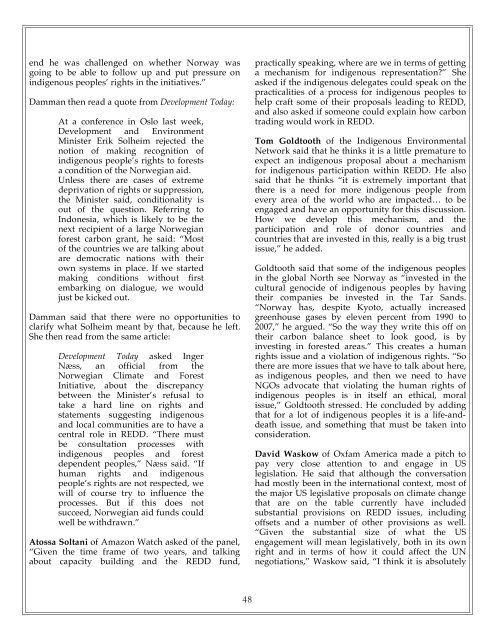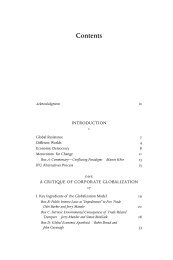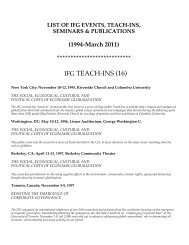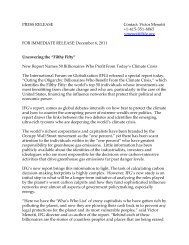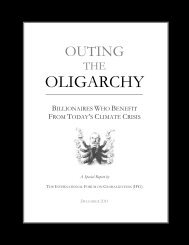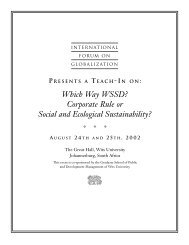UNDRIP Report - English FINAL - International Forum on Globalization
UNDRIP Report - English FINAL - International Forum on Globalization
UNDRIP Report - English FINAL - International Forum on Globalization
You also want an ePaper? Increase the reach of your titles
YUMPU automatically turns print PDFs into web optimized ePapers that Google loves.
end he was challenged <strong>on</strong> whether Norway was<br />
going to be able to follow up and put pressure <strong>on</strong><br />
indigenous peoples’ rights in the initiatives.”<br />
Damman then read a quote from Development Today:<br />
At a c<strong>on</strong>ference in Oslo last week,<br />
Development and Envir<strong>on</strong>ment<br />
Minister Erik Solheim rejected the<br />
noti<strong>on</strong> of making recogniti<strong>on</strong> of<br />
indigenous people’s rights to forests<br />
a c<strong>on</strong>diti<strong>on</strong> of the Norwegian aid.<br />
Unless there are cases of extreme<br />
deprivati<strong>on</strong> of rights or suppressi<strong>on</strong>,<br />
the Minister said, c<strong>on</strong>diti<strong>on</strong>ality is<br />
out of the questi<strong>on</strong>. Referring to<br />
Ind<strong>on</strong>esia, which is likely to be the<br />
next recipient of a large Norwegian<br />
forest carb<strong>on</strong> grant, he said: “Most<br />
of the countries we are talking about<br />
are democratic nati<strong>on</strong>s with their<br />
own systems in place. If we started<br />
making c<strong>on</strong>diti<strong>on</strong>s without first<br />
embarking <strong>on</strong> dialogue, we would<br />
just be kicked out.<br />
Damman said that there were no opportunities to<br />
clarify what Solheim meant by that, because he left.<br />
She then read from the same article:<br />
Development Today asked Inger<br />
Næss, an official from the<br />
Norwegian Climate and Forest<br />
Initiative, about the discrepancy<br />
between the Minister’s refusal to<br />
take a hard line <strong>on</strong> rights and<br />
statements suggesting indigenous<br />
and local communities are to have a<br />
central role in REDD. “There must<br />
be c<strong>on</strong>sultati<strong>on</strong> processes with<br />
indigenous peoples and forest<br />
dependent peoples,” Næss said. “If<br />
human rights and indigenous<br />
people’s rights are not respected, we<br />
will of course try to influence the<br />
processes. But if this does not<br />
succeed, Norwegian aid funds could<br />
well be withdrawn.”<br />
Atossa Soltani of Amaz<strong>on</strong> Watch asked of the panel,<br />
“Given the time frame of two years, and talking<br />
about capacity building and the REDD fund,<br />
practically speaking, where are we in terms of getting<br />
a mechanism for indigenous representati<strong>on</strong>?” She<br />
asked if the indigenous delegates could speak <strong>on</strong> the<br />
practicalities of a process for indigenous peoples to<br />
help craft some of their proposals leading to REDD,<br />
and also asked if some<strong>on</strong>e could explain how carb<strong>on</strong><br />
trading would work in REDD.<br />
Tom Goldtooth of the Indigenous Envir<strong>on</strong>mental<br />
Network said that he thinks it is a little premature to<br />
expect an indigenous proposal about a mechanism<br />
for indigenous participati<strong>on</strong> within REDD. He also<br />
said that he thinks “it is extremely important that<br />
there is a need for more indigenous people from<br />
every area of the world who are impacted… to be<br />
engaged and have an opportunity for this discussi<strong>on</strong>.<br />
How we develop this mechanism, and the<br />
participati<strong>on</strong> and role of d<strong>on</strong>or countries and<br />
countries that are invested in this, really is a big trust<br />
issue,” he added.<br />
Goldtooth said that some of the indigenous peoples<br />
in the global North see Norway as “invested in the<br />
cultural genocide of indigenous peoples by having<br />
their companies be invested in the Tar Sands.<br />
“Norway has, despite Kyoto, actually increased<br />
greenhouse gases by eleven percent from 1990 to<br />
2007,” he argued. “So the way they write this off <strong>on</strong><br />
their carb<strong>on</strong> balance sheet to look good, is by<br />
investing in forested areas.” This creates a human<br />
rights issue and a violati<strong>on</strong> of indigenous rights. “So<br />
there are more issues that we have to talk about here,<br />
as indigenous peoples, and then we need to have<br />
NGOs advocate that violating the human rights of<br />
indigenous peoples is in itself an ethical, moral<br />
issue,” Goldtooth stressed. He c<strong>on</strong>cluded by adding<br />
that for a lot of indigenous peoples it is a life-anddeath<br />
issue, and something that must be taken into<br />
c<strong>on</strong>siderati<strong>on</strong>.<br />
David Waskow of Oxfam America made a pitch to<br />
pay very close attenti<strong>on</strong> to and engage in US<br />
legislati<strong>on</strong>. He said that although the c<strong>on</strong>versati<strong>on</strong><br />
had mostly been in the internati<strong>on</strong>al c<strong>on</strong>text, most of<br />
the major US legislative proposals <strong>on</strong> climate change<br />
that are <strong>on</strong> the table currently have included<br />
substantial provisi<strong>on</strong>s <strong>on</strong> REDD issues, including<br />
offsets and a number of other provisi<strong>on</strong>s as well.<br />
“Given the substantial size of what the US<br />
engagement will mean legislatively, both in its own<br />
right and in terms of how it could affect the UN<br />
negotiati<strong>on</strong>s,” Waskow said, “I think it is absolutely<br />
48


